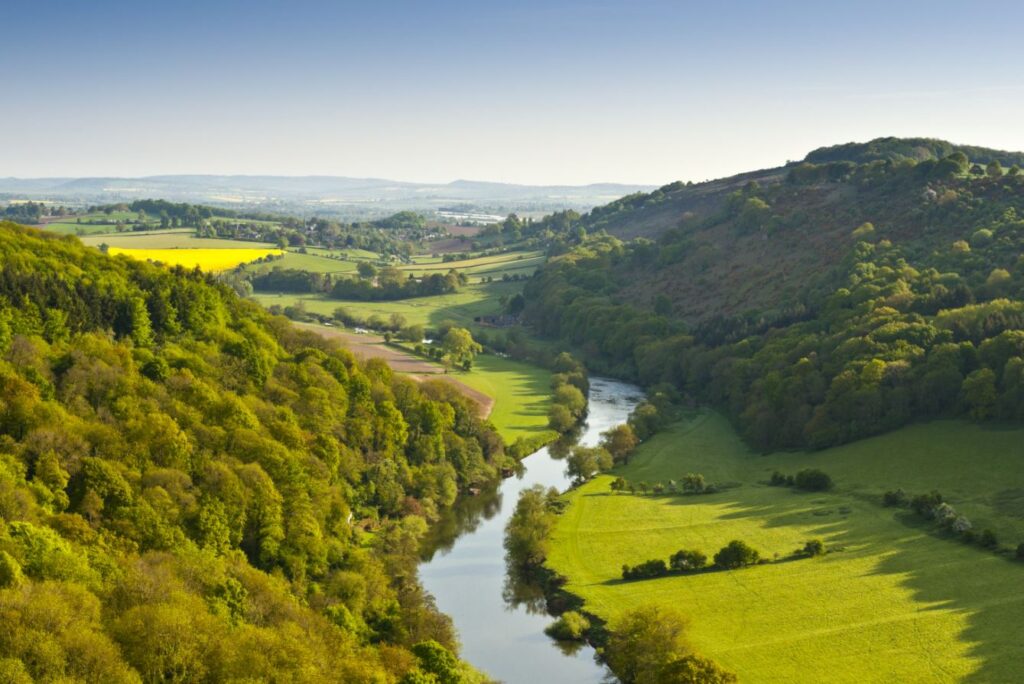Note: If you wish to receive, via e-mail, (1) my weekly newsletter or (2) daily copies of these posts, notify me at rrbates1951@gmail.com and indicate which you would like. I promise not to share your e-mail address with anyone. To unsubscribe, send me a follow-up email.
Thursday – Thanksgiving
When it comes to poetic treatments of gratitude, few supersede William Wordsworth’s “Tintern Abbey.” Indeed, I’m surprised I haven’t used it for a Thanksgiving blog post in the past. In any event, for those of us feeling down about the current state of the world, the poem calls us to a “cheerful faith that all which we behold is full of blessings.”
In the poem, Wordsworth has returned to a picturesque spot on the Wye River that he visited five years previously. This visit is far different, however, since earlier he came to find a refuge in nature. After all, at 23 he’d just had a tempestuous experience in France, what with the beginning of the Reign of Terror and his liaison with Annette Vallon, with whom he had a child. As he describes his previous visit to the Wye, he was
more like a man
Flying from something that he dreads, than one
Who sought the thing he loved.
In his earlier visit, he was also not particularly reflective. He describes the kind of person he was and his particular relationship with nature as follows:
For nature then
(The coarser pleasures of my boyish days
And their glad animal movements all gone by)
To me was all in all.—I cannot paint
What then I was. The sounding cataract
Haunted me like a passion: the tall rock,
The mountain, and the deep and gloomy wood,
Their colors and their forms, were then to me
An appetite…
It is a far more reflective Wordsworth that visits the spot five years later. Although he still revels in nature, he now realizes that nature’s “beauteous forms” will feed his soul in the future. His expression of gratitude is why “Tintern Abbey” works for me as a Thanksgiving poem.
Memories of the Wye River’s “steep and lofty cliffs,” he reports, nourish him when he feeling lonely and depressed:
But oft, in lonely rooms, and ‘mid the din
Of towns and cities, I have owed to them,
In hours of weariness, sensations sweet,
Felt in the blood, and felt along the heart;
And passing even into my purer mind
With tranquil restoration…
The poet speculates that these “sensations sweet” have helped shape the best part of him, leading to “little, nameless, unremembered, acts of kindness and of love.”
But that’s not all the memories do. Wordsworth writes that, when his mind wanders back over the Wye visit and other such encounters with nature, he sometimes experiences a mystical feeling of oneness with the cosmos:
Nor less, I trust,
To them I may have owed another gift,
Of aspect more sublime; that blessed mood,
In which the burthen of the mystery,
In which the heavy and the weary weight
Of all this unintelligible world,
Is lightened:—that serene and blessed mood,
In which the affections gently lead us on,—
Until, the breath of this corporeal frame
And even the motion of our human blood
Almost suspended, we are laid asleep
In body, and become a living soul:
While with an eye made quiet by the power
Of harmony, and the deep power of joy,
We see into the life of things.
Realizing that he may be leaving the reader a little behind here—not all of us have mystical moments upon recalling a nature walk—Wordsworth pulls back a little. Even if his own out of body experiences be but “vain belief,” he says, these memories will still help us through depression and hard times:
If this
Be but a vain belief, yet, oh! how oft—
In darkness and amid the many shapes
Of joyless daylight; when the fretful stir
Unprofitable, and the fever of the world,
Have hung upon the beatings of my heart—
How oft, in spirit, have I turned to thee,
O sylvan Wye! thou wanderer thro’ the woods,
How often has my spirit turned to thee!
Wordsworth is not done yet, however. In the poem’s final section, Wordsworth lets us know that he’s not alone. His younger sister is with him—he gets added delight from looking at the scene through her eyes—and he imagines that the scene will also nourish her in the future. No longer thinking only of himself, he is even more grateful that these memories will bolster someone he deeply loves. Again he references the world’s harshness as he describes the healing process:
Oh! yet a little while
May I behold in thee what I was once,
My dear, dear Sister! and this prayer I make,
Knowing that Nature never did betray
The heart that loved her; ’tis her privilege,
Through all the years of this our life, to lead
From joy to joy: for she can so inform
The mind that is within us, so impress
With quietness and beauty, and so feed
With lofty thoughts, that neither evil tongues,
Rash judgments, nor the sneers of selfish men,
Nor greetings where no kindness is, nor all
The dreary intercourse of daily life,
Shall e’er prevail against us, or disturb
Our cheerful faith, that all which we behold
Is full of blessings.
Today is not the day to spell out our own versions of evil tongues, rash judgments, sneers, unkindness, and dreary encounters. Nor is it a day to dwell on “solitude, or fear, or pain, or grief,” which the poet also foresees as possibilities within his sister’s future. Rather we, like William and Dorothy, can be grateful for how, through our encounters with natural beauty, our memories can become “a dwelling-place for all sweet sounds and harmonies.” Wordsworth reminds us that our most precious memories—the ones we are most grateful for—are those that include someone we love.
Which is the perfect message for this holiday that celebrates family.


